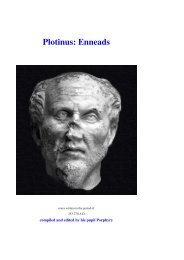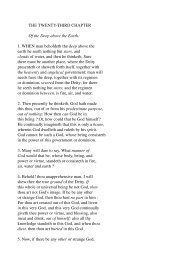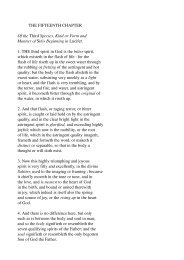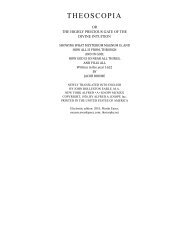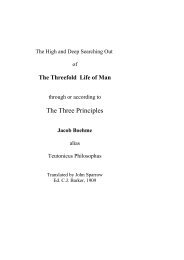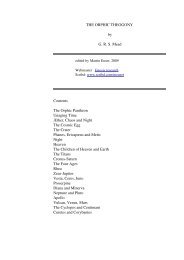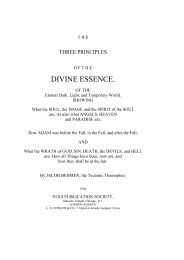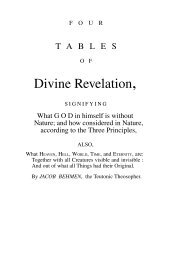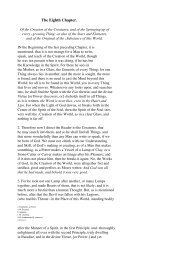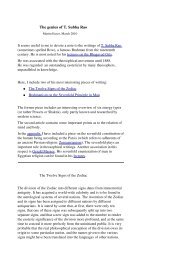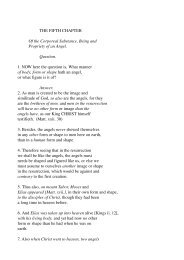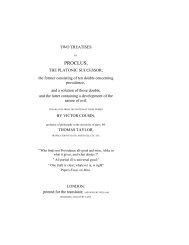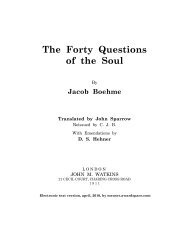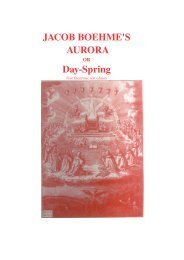Gerald Massey's Lectures - Society in evolution - Awardspace
Gerald Massey's Lectures - Society in evolution - Awardspace
Gerald Massey's Lectures - Society in evolution - Awardspace
Create successful ePaper yourself
Turn your PDF publications into a flip-book with our unique Google optimized e-Paper software.
Egyptian, it is probable that the name is so likewise. Las (or ras) signifies to be raised up,<br />
and aru is another name for the Mummy-type; so that Las-aru, or Lazarus, with the<br />
Greek term<strong>in</strong>al, is the Egyptian symbol of resurrection called the Karast, or Christ. This<br />
typical and pictorial representation of the ris<strong>in</strong>g from the dead would become the story of<br />
Lazarus <strong>in</strong> the natural course of humanis<strong>in</strong>g the Mythos.<br />
A RETORT.<br />
I am sorry to trouble my readers with a matter so personal as the present subject. It has<br />
been found out that I am not <strong>in</strong>fallible. Like my fellow-mortals, I can fall <strong>in</strong>to error. I<br />
have to acknowledge and regret a stupid blunder, perceived, alas! too late (p. 15 of the<br />
Historical Jesus and Mythical Christ; also p. 419, Vol. II., "Natural Genesis").<br />
In compar<strong>in</strong>g with Egyptian certa<strong>in</strong> Syro-Chaldaic and Aramean words which have been<br />
left untranslated <strong>in</strong> the Greek text of the New Testament, I <strong>in</strong>cluded the word "sent,"<br />
entirely forgett<strong>in</strong>g that it was English when I compared it with the Egyptian "shent," a<br />
"pool," and "sunnt," a heal<strong>in</strong>g bath. The nature of my <strong>in</strong>advertence is proved <strong>in</strong> the very<br />
next l<strong>in</strong>es by the remark:--"There is no need to stra<strong>in</strong> a s<strong>in</strong>gle po<strong>in</strong>t for the purpose of<br />
mak<strong>in</strong>g ends meet!"<br />
It was foolish, but such is the simple fact, and I will not seek to m<strong>in</strong>imise my mistake.<br />
Any one engaged <strong>in</strong> attack<strong>in</strong>g what he considers the supreme delusion of the European<br />
m<strong>in</strong>d, and the crown<strong>in</strong>g error of all time, ought to be free from the smallest errors<br />
himself. Would that it were possible! For the most is sure to be made by the enemy of the<br />
least lapse, more especially by those who have been consecrated to the service of<br />
falsification.<br />
My error drew the attention of a Mr. Coleman, and <strong>in</strong>duced him to write an article <strong>in</strong> the<br />
Religio-Philosophical Journal of Chicago last October, of which no copy was sent to me<br />
by the writer or publisher. To this my attention has just been called; also to a letter by the<br />
same writer which appeared <strong>in</strong> the same journal, dated February 5th, headed "Op<strong>in</strong>ions of<br />
Em<strong>in</strong>ent Egyptologists regard<strong>in</strong>g Mr. <strong>Massey's</strong> alleged Egypto-Christian parallels."<br />
Unfortunately, the letter will necessitate a reply to the previous article. In this letter the<br />
Rev. A. H. Sayce is reported to say of me to Mr. Coleman, "Many thanks for your very<br />
thorough demolition of Mr. <strong>Massey's</strong> crudities. It is difficult to understand how a man<br />
can have the effrontery to put forward such a mass of ignorance and false quotation. You<br />
have done a real service to the cause of truth by expos<strong>in</strong>g him so fully. You ask me if I<br />
can detect any errors <strong>in</strong> your essay. Errors enough on the part of Mr. Massey, but they<br />
have all been exposed impartially and mercilessly by yourself."<br />
Mr. Coleman cont<strong>in</strong>ues, and quotes the follow<strong>in</strong>g from "one of the ablest Egyptologists<br />
<strong>in</strong> England," who is "now connected with the British Museum," of whom he says, "ow<strong>in</strong>g<br />
to the rather personal character of some of his remarks, it is thought better that his name<br />
be not published." The writer says to Mr. Coleman,--"You are right <strong>in</strong> your exposure of<br />
Mr. Massey. Some people th<strong>in</strong>k him dishonest; and that he is quite conscious of the<br />
ridiculous blunders which he publishes. I do not th<strong>in</strong>k so after hav<strong>in</strong>g exam<strong>in</strong>ed his large<br />
book. It is a work which I should have thought could only have been written <strong>in</strong> Bedlam.<br />
No lunatic could possibly write more wild rubbish, without the least consciousness of the<br />
<strong>in</strong>credible ignorance displayed throughout. The man is AT ONCE an ignoramus of the<br />
worst k<strong>in</strong>d, viz., not <strong>in</strong> the least be<strong>in</strong>g aware of his ignorance, and he has the pretension<br />
of expla<strong>in</strong><strong>in</strong>g th<strong>in</strong>gs which cannot be understood (except by trust<strong>in</strong>g other persons)<br />
without a considerable knowledge of different languages, which he does not possess." If<br />
the words here used have any real relationship to known facts, it seemed to me that the



